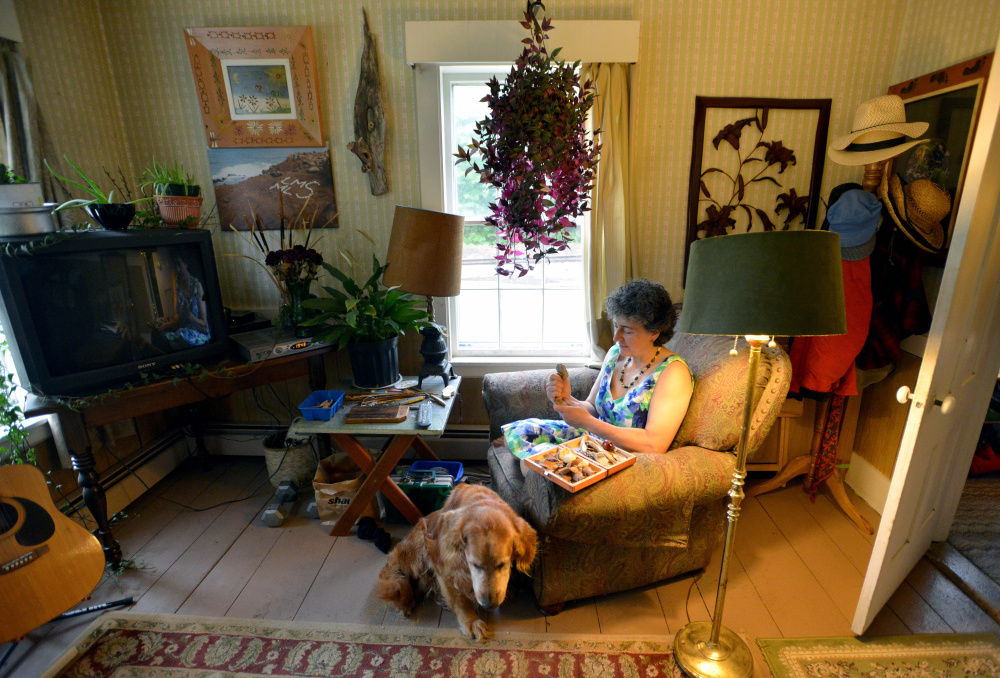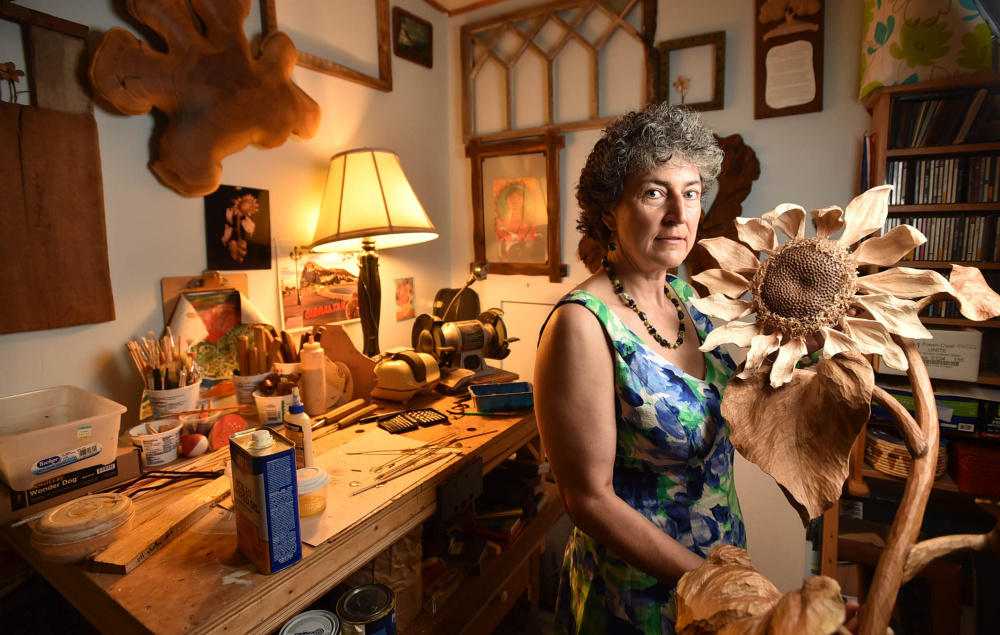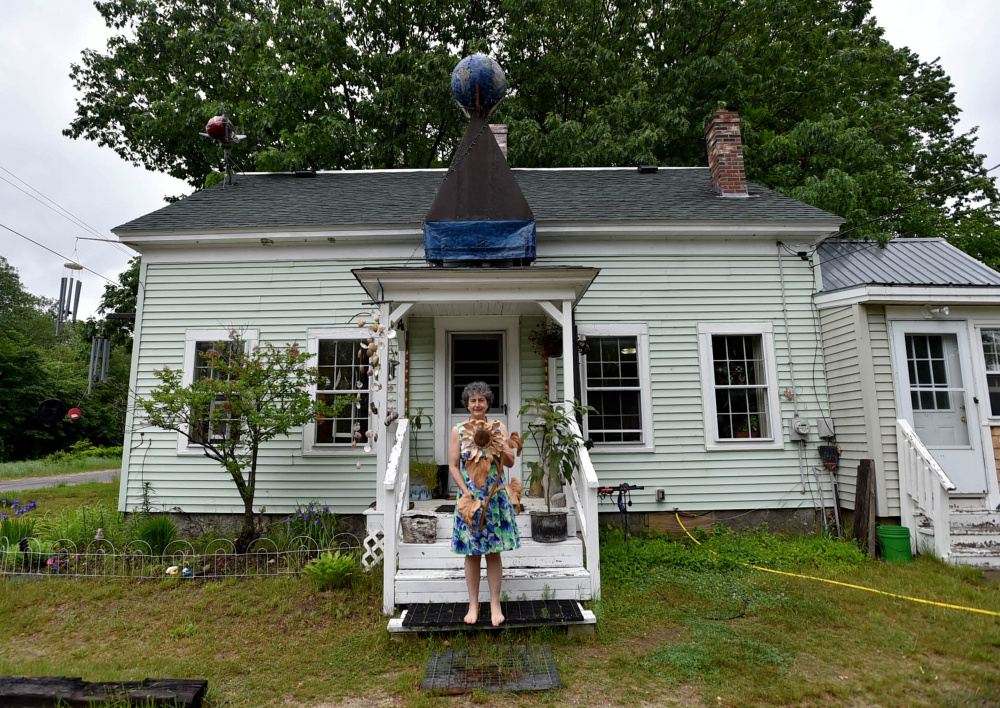CANTON — Four years ago, Canton artist Laurie Sproul found herself deeply frustrated as she searched for ways that she, as an individual, could take action against what she saw as the impending threat of climate change.
She had come across local environmentalist groups working in their communities but craved something on a grander scale with the potential for “massive impact.” So in the middle of a snowstorm, she and her mother trekked to a climate change conference at the Augusta Civic Center where they ran across a booth for the Citizens’ Climate Lobby, a national group of citizen volunteers who, with laser-like focus, lobby members of Congress for a market-driven solution to carbon emissions.
“We saw that booth and it was about a national price on carbon, and I looked at (my mom) and said ‘this is it!” Sproul recalled. “The more I learn about the proposal that Citizens’ Climate Lobby has put forth, the more it is totally engaging and viable and the more I want to help the public know that that’s a real solution for climate change.”
Sproul now volunteers with the Citizens’ Climate Lobby, helping them use art to start conversations about what can arguably be a dry and abstract subject. Along with Winslow-based artist Jean Ann Pollard, Sproul is hoping her art can help break down barriers to discussions on climate change, which over the last decade has transformed from a bipartisan issue — albeit with different takes on its causes and solutions — to one that is no longer acknowledged by large swaths of one of the country’s two major political parties.
“Art is a great communicator,” Sproul said. “It kind of communicates with a deeper, fundamental level in our psyche.”
This past week Sproul and Pollard’s artwork traveled to Washington, D.C., for the eighth annual Citizen’s Climate Lobby & Citizen’s Climate Education International Conference & Lobby Day, a three-day conference where approximately 1,300 volunteers from chapters across the country gathered to learn how to effectively raise public awareness around climate change and carbon pricing, grow the group’s ranks and lobby members of Congress to take action. Nearly 1,000 of those volunteers stayed on to lobby staff or officeholders from approximately 500 of the 535 Congressional seats.
PROGRESS BEHIND THE SCENES
By all appearances, it seems there is little executive or legislative will to act on climate change, but behind the scenes the Citizens’ Climate Lobby has been successfully working to build consensus around the group’s carbon fee and dividend proposal, which proponents say is the most effective, market-friendly, bipartisan and fair approach to curbing carbon emissions.
Originally conceived by Republicans, the model places a fee on carbon dioxide emissions at the point of extraction, such as oil wells or coal mines. All of the proceeds of the carbon fee then go to American households to help offset rising consumer energy costs as energy companies pass their own increased costs down the supply chain and on to consumers. As the price of carbon increases, the model posits, those companies will move away from carbon-based fuels and increase their investment in non-carbon producing energies like solar, wind and nuclear.
In 2016, the Citizens’ Climate Lobby documented 1,391 meetings with staff or members of Congress on the carbon fee, up from 106 in 2010. In the last year, the group generated 40,721 letters to Congress, 2,931 media stories and editorials, and held 2,387 outreach events.
That pressure has been making an impact. Each year more members from both sides of the aisle are acknowledging the reality of climate change and the need to take preventive action to avoid its worst effects. A growing number have joined the bipartisan House Climate Solutions Caucus, the brainchild of a Citizens’ Climate Lobby volunteer, which works together on policy responses to the causes and impacts of climate change.
Founded in February 2016, the Climate Solutions Caucus now includes 40 members of Congress, 20 from each party. Members sign up in twos, one Democrat, one Republican, to maintain the group’s bipartisan balance. At the current rate, the caucus is gaining six new members a month.
Those numbers are notable in a political environment where mention of the words “climate change” can spell disaster for some politicians. Members of the Citizens’ Climate Lobby attribute their success to the group’s persistent yet respectful approach to lobbying.
“One of the things that I have found over the years is that the staff and the members of Congress, if you meet them, are very appreciative of the fact that we come in appreciating them for the work they do,” said Peter Garrett, regional coordinator for Citizens’ Climate Lobby chapters in Maine, New Hampshire and Vermont. “We don’t go into an office unless we have a reason on hand to appreciate them for.”
Before heading to Capitol Hill, Citizens’ Climate volunteers are expected to do their research on the issues most important to their assigned Congress members in order to figure out how best to frame their arguments about climate change and the group’s recommended policy response. The group also assigns individual liaisons to each member of Congress. After lobbying days, those liaisons follow up with information to help answer questions or address concerns raised in the meetings.
This past week, Garrett and other volunteers met with staff for all of Maine’s representatives, urging Reps. Bruce Poliquin and Chellie Pingree to join the House Climate Solutions Caucus and pushing for Sens. Susan Collins and Angus King to sponsor carbon pricing legislation and form an equivalent climate working group in the Senate.
In a meeting with staff from Rep. Bruce Poliquin’s office, Garrett saw what he believed was new interest in the group’s work and policy ideas. Volunteers met with a new member of Poliquin’s staff who seemed to show more interest in the meeting than they had seen in previous years, Garrett said. Though it was clear Poliquin does not favor the group’s carbon fee and dividend solution, the staff member seemed eager to hear about alternatives.
“For Poliquin the conversation has really changed,” Garrett said. “In earlier meetings we got the impression that he wasn’t really interested, and so the meeting turned out to be a bit of a marking time kind of effort, but this time the staff person was really listening and we got the impression that so is Bruce Poliquin.”
Poliquin spokesman Brendan Conley confirmed the Congressman does not support a climate tax, but said Poliquin “will be reviewing the details of the Climate Solutions Caucus in Congress.”
“The Congressman is a strong supporter of efforts to protect our environment — including funding for specific environmental programs in Maine — that offer practical solutions to protect our planet and that enhance our state’s economic growth and competitiveness, two priorities that are not mutually exclusive,” Conley wrote in an email.
Staff from Pingree’s office made clear that Pingree is committed to joining the House climate caucus and needed to find a Republican colleague to join with, Garrett said.
“She finally, I think, sees now is the time because the caucus has grown to a sufficient size that she sees that she really has to be part of it,” Garrett said. “Before I think it was kind of a wait and see.”
In an email, Pingree spokesman Andrew Colvin said the Congresswoman is interested in joining the caucus and sees “definite potential in the carbon fee and dividend approach, but, as in all issues, (the Congresswoman) would need to see the details of an exact proposal to see if it would work as expected.”
In conversations with staff for Sen. Susan Collins this week, Garrett said the group ran through the proposal they would like Collins to put forward and learned that because Collins does not sit on the relevant Senate committee she would need to find another, better positioned Republican colleague to work with.
For Sen. Angus King, already well-versed in the science of climate change, the issue was one of personal political capital and how best to use that capital to make an impact. King has a habit of passing out business-sized cards filled with climate data to his colleagues in the Senate, Garrett said.
“Each of them comes at it from a somewhat different angle, and the skill of we as volunteer lobbyists is to recognize and to acknowledge that they’re not all like a collection of dominos,” Garrett said. “Each of them have particular concerns, so how do we meet them?”
A MARKET BASED SOLUTION
The volunteers use the results of a 2014 study commissioned by the Citizens’ Climate Lobby to help make their case. The study found that if Congress levied a $10 fee on fuel producers for every metric ton of carbon dioxide they produced in 2016, a fee that would then rise by $10 increments each year, it would create 2.1 million more jobs, prevent 13,000 premature deaths a year and result in a 33 percent reduction in carbon dioxide emissions by 2025 compared with a model that did not include the fee. By 2035, those numbers would jump to 2.8 million more jobs, more than 14,000 fewer deaths a year and a 52 percent decrease in emissions.
The study also found that through the dividend, U.S. households would receive $400 billion a year by 2025, or approximately $300 per month for a family of four, to help offset their energy costs. Researchers found carbon fees would hasten the closing of coal plants and lead to increased investment in energies like wind, solar and nuclear power, adding an additional $80 billion to $90 billion to the U.S. gross domestic product.
The findings were not universally positive, however. Even with the dividend, the fee would increase Americans’ cost of living by around three percent by 2025. While most states would see job growth, energy-producing states like Texas, Oklahoma, Louisiana and Arkansas would lose jobs and experience a decline in their gross regional product (or GDP for the region).
Real world case studies support much of the 2014 study’s findings. There are at least 40 carbon pricing programs around the world from Sweden to British Columbia that have helped decrease emissions while maintaining business competitiveness, says Thomas Tietenberg, Mitchell Family Professor of Economics Emeritus at Colby College.
Tietenberg spent more than 30 years studying economic approaches to environmental protection and in that time became convinced, along with most of the world’s economists, he argues, that the most effective and cheapest means of reducing carbon emissions is through carbon pricing.
“One of the interesting things to me is how many businesses actually support the carbon tax,” Tietenberg said. “They want certainty and they think that some kind of control on carbon is going to be absolutely essential. If you delay it, then you’ll have less time to act and will have to do more stringent things to act, so it’s going to be more expensive.”
Tietenberg supports the fee and dividend model specifically because he believes it is ultimately more fair to consumers, especially poorer consumers, than a tax. Any price increase on carbon will inevitably make its way through the supply chain to consumers. For lower income Americans, that translates to a higher proportion of their income going toward energy costs.
“With rebates, all of the revenues go back to the people in a monthly dividend, and the way they’re done is in such a way that basically two thirds of people would end up better off financially than before the tax. That is to say the rebate would be greater than their actual increase in expenditures on the energy,” Tietenberg said.
KEEPING THE PRESSURE ON
At the heart of the Citizen’s Climate Lobby’s success is its growing legion of volunteers who, armed with facts and an urgent sense of mission, create sustained pressure on U.S. representatives to take on climate change and consider a carbon fee and dividend in their efforts to reduce emissions.
The group harnesses communicators of all stripes to make the case to Americans and their representatives that every individual is empowered to work to prevent the worst effects of climate change.
For Winslow artist Jean Ann Pollard, whose artwork was featured at this week’s Citizens’ Climate conference, it is precisely the group’s citizens focused approach that makes the Citizen’s Climate Lobby so effective.
“It’s bottom up,” Pollard said. “Where it should have been all along.”
Kate McCormick — 861-9218
kmccormick@centralmaine.com
Twitter: @KateRMcCormick
Send questions/comments to the editors.











Success. Please wait for the page to reload. If the page does not reload within 5 seconds, please refresh the page.
Enter your email and password to access comments.
Hi, to comment on stories you must . This profile is in addition to your subscription and website login.
Already have a commenting profile? .
Invalid username/password.
Please check your email to confirm and complete your registration.
Only subscribers are eligible to post comments. Please subscribe or login first for digital access. Here’s why.
Use the form below to reset your password. When you've submitted your account email, we will send an email with a reset code.